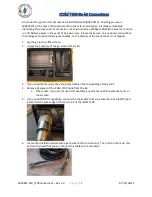
10
2. CONNECTING TV AND THE SOURCE EQUIPMENT WITH HDMI OUTs
• The HDMI connection can carry uncompressed digital video signals and digital audio signals.
• This unit can output digital video and digital audio signals from the HDMI OUT of this unit without any conversion as they
were input into the HDMI IN.
Connecting the source equipment with the HDMI OUT connector
• If your source equipment (DVD player, set-top box, etc.) has the HDMI OUT connector, connect it to the HDMI IN 1 or 2
connector of this unit using a commercially available HDMI cord.
Connecting the source equipment with the DVI OUT connector
• If your source equipment has the DVI OUT connector compatible with DVI and High-bandwidth Digital Content
Protection (HDCP), connect it to the HDMI IN 1 or 2 connector of this unit using a commercially available HDMI-DVI
converter cord.
Since the HDMI-to-DVI connection cannot carry audio signals, you should make the digital audio connection(and the
analog audio connection if needed) between the source equipment and the display equipment (or A/V amp, receiver)
Connecting the display equipment
• For details on how to connect the display equipment, refer to "Connecting the display equipment with the HDMI IN
connector" and "Connecting the display equipment with the DVI IN connector" on previous page.
Note 1:
When the HDMI OUT connector of the
source equipment is connected to this
unit, the OPTICAL OUT of this unit can
output the same digital audio signals
that are input into the HDMI IN 1 or 2
connector. In such a case, if the DVI IN
connector of the display equipment is
connected to the HDMI OUT connector
of this unit, you should connect the
OPTICAL OUT jack to the OPTICAL IN
jack of the display equipment(or A/V
amp, receiver).
However, when the digital audio signals
from DVD Audio or the multi-channel
PCM signals are input into the HDMI IN
of this unit, these signals cannot be
output from the OPTICAL OUT of this
unit.
HSB-600(A) 2006.4.25 12:29 PM 페이지 10


































